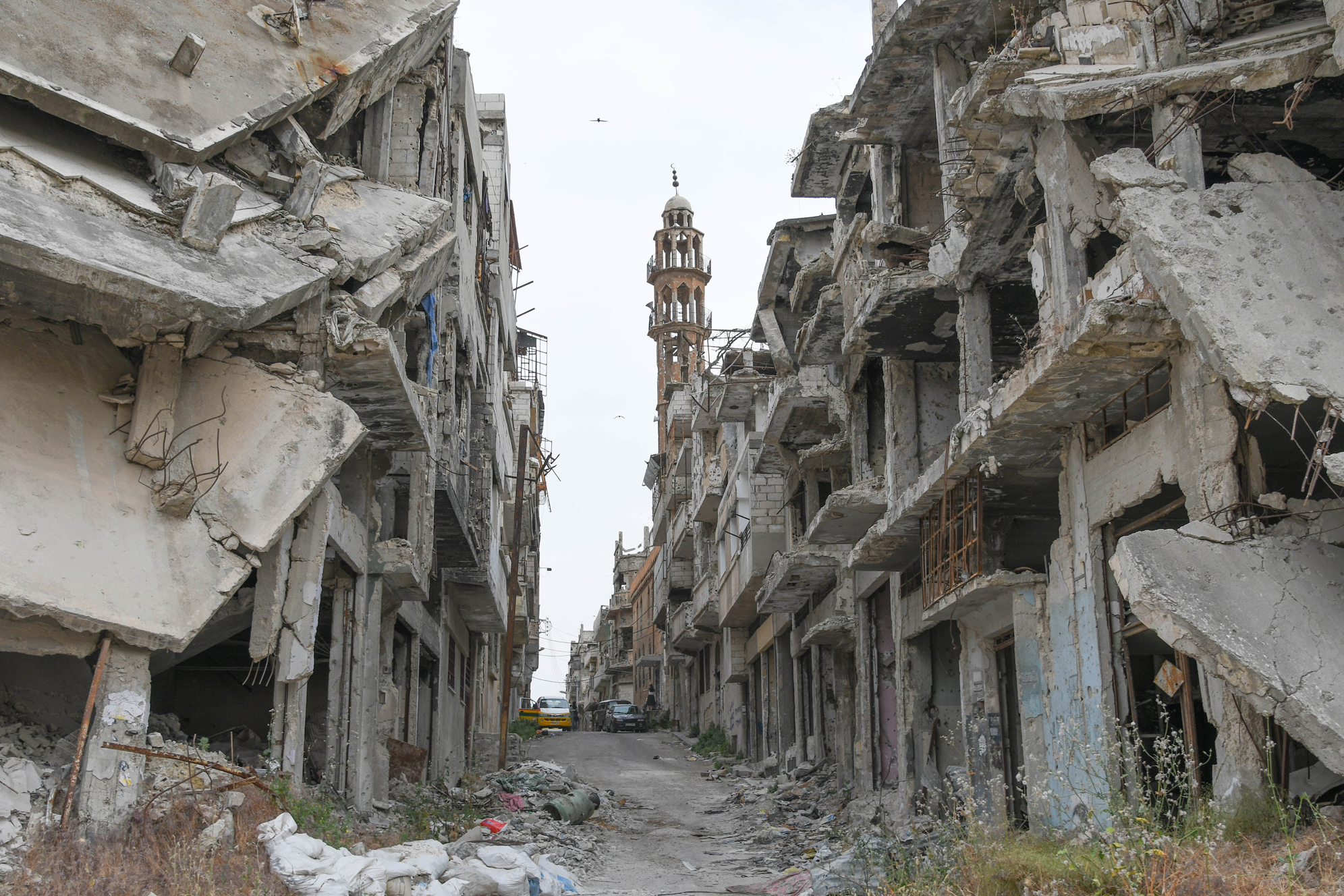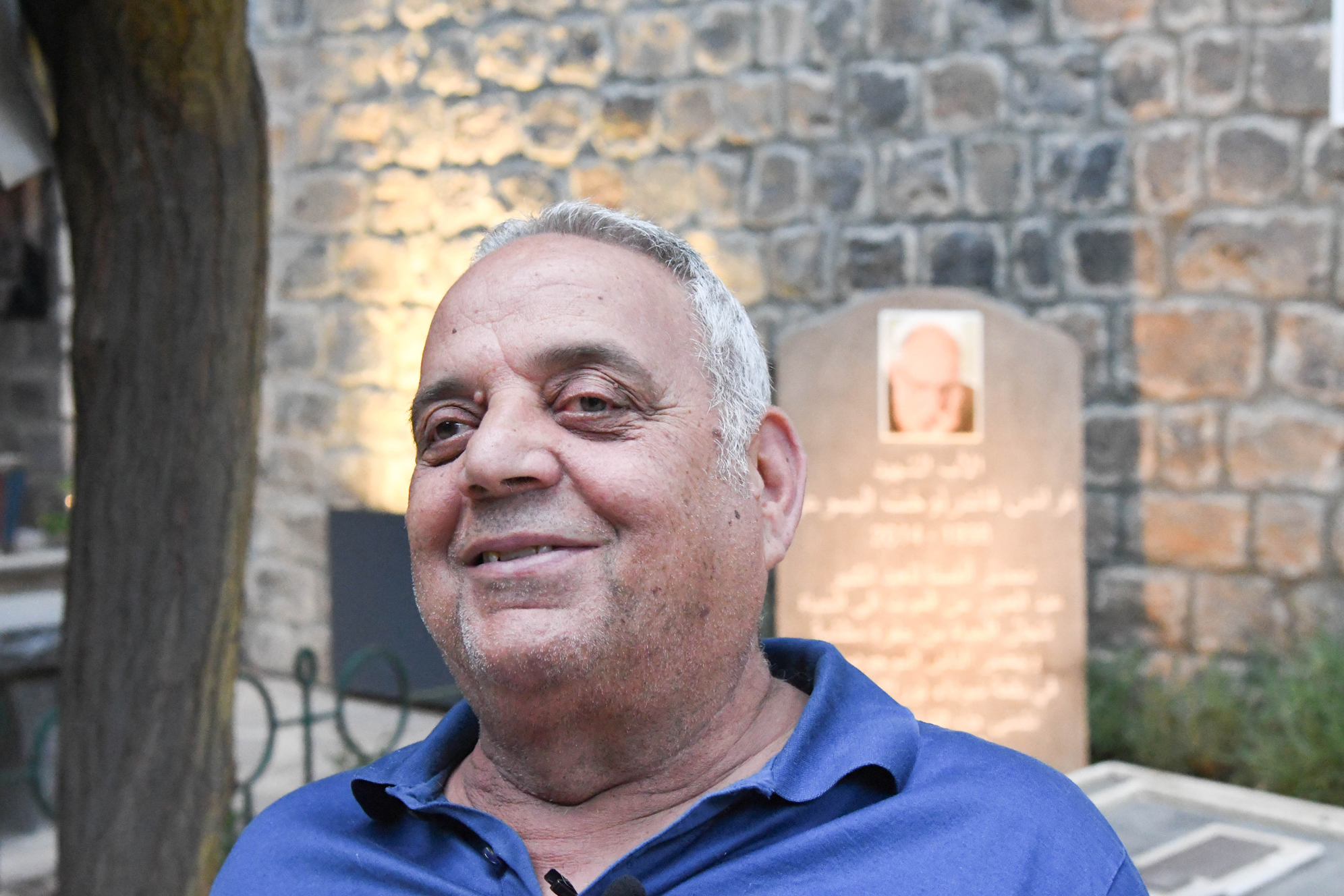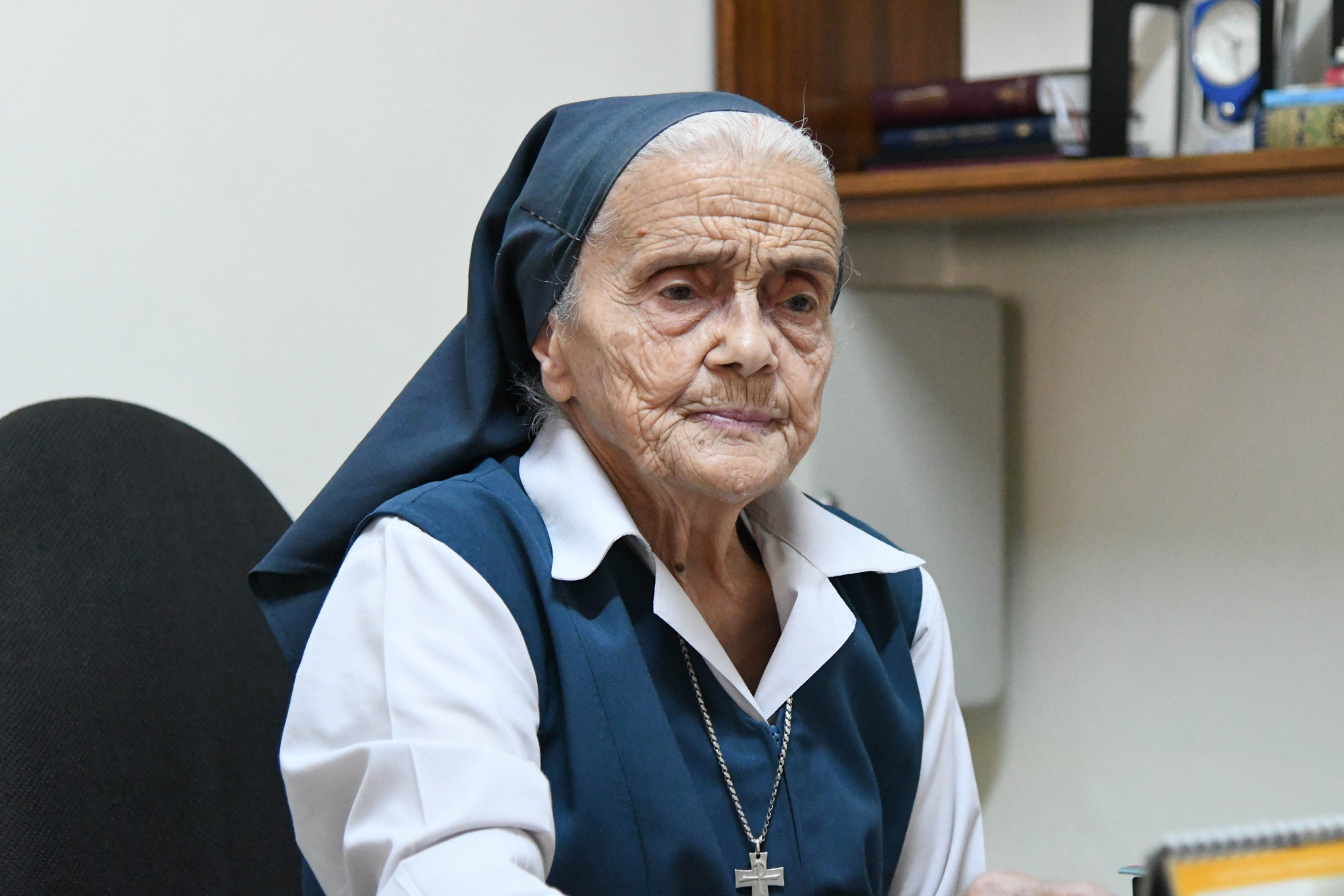REPORTAGE/4
The Jesuits’ house is located in the destroyed districts of Homs, in the old part of the city. Here Father Frans van der Lugt was murdered in cold blood on the 7th of April of five years ago. His commitment for the most marginalized and his protests against the lack of food, medicines and assistance for the besieged population cost him his own life. The efforts of Father Frans continue today thanks to a small community of Jesuits. A few hundred metres further on, two nuns of the Sacred Heart carry out their mission among the elderly abandoned and left alone as a result of the war. Buds of hope amidst the rubble…

 In the destroyed districts of Homs, the Jesuit house situated in the old part of the city appears as an oasis of peace. After all, as the locals say, it always has been. Here, during the fights between the Syrian regular army and the militias of the Free Syrian Army and the jihadists of al Nusra, in a siege that lasted for years, hundreds of people of all creeds and ethnicities, who had lost everything because of the war, found refuge and hospitality. Here, in the quarter of Bustan al-Diwan, they used to meet Father Frans van der Lugt, a Dutch Jesuit whose commitment to the poorest and most vulnerable cost him his life. He was a man of reconciliation, a shepherd with the smell of the sheep – as Pope Francis often recalls – who refused to abandon his flock until the end. He strongly denounced the lack of food, medicines and assistance for the besieged population. On 7 April five years ago the Jesuit priest was killed in his convent by a man wearing a mask, after having refused to follow him. His mortal remains were laid to rest in the same small courtyard where he used to spend time with the poor, who have not forgotten him. Every day many people come to pray at his tomb.
In the destroyed districts of Homs, the Jesuit house situated in the old part of the city appears as an oasis of peace. After all, as the locals say, it always has been. Here, during the fights between the Syrian regular army and the militias of the Free Syrian Army and the jihadists of al Nusra, in a siege that lasted for years, hundreds of people of all creeds and ethnicities, who had lost everything because of the war, found refuge and hospitality. Here, in the quarter of Bustan al-Diwan, they used to meet Father Frans van der Lugt, a Dutch Jesuit whose commitment to the poorest and most vulnerable cost him his life. He was a man of reconciliation, a shepherd with the smell of the sheep – as Pope Francis often recalls – who refused to abandon his flock until the end. He strongly denounced the lack of food, medicines and assistance for the besieged population. On 7 April five years ago the Jesuit priest was killed in his convent by a man wearing a mask, after having refused to follow him. His mortal remains were laid to rest in the same small courtyard where he used to spend time with the poor, who have not forgotten him. Every day many people come to pray at his tomb.
Recovering hope. Father Michel Daoud, “Syro-Lebanese”, is one of the four Jesuit Fathers who live in the Home, carrying out the pastoral ministry that was once of Father Frans. “The siege is over, there is no more gunfire, but the rubble scattered all around – he said – speaks of a city that is struggling to recover despite the yearning to start anew.
We are trying to rebuild people’s confidence and maybe someone is not too happy about this.
Our service is addressed to all Christians and Muslims, without distinction.” During the war years the Jesuits supplied water, food, electricity, medicines, and a constant human presence above all. “Many people from this and other surrounding areas – remembers Father Michel – would come to our House to regain some trust and hope. The younger ones rediscovered the pleasure of playing in our small courtyard. Some recharged their mobile phones to try to call their dear ones who had escaped the siege, while others rested making the most of the silence inside the convent. Even after the martyrdom of Father Frans, people never stopped coming. They are not afraid and have chosen our house as their home, where they feel safe. To us, this is a reason for great hope.”
“Keep hoping to rebuild the man from the rubble.”
The legacy of Father Frans is reflected in these words, which could now enjoy further recognition. “With the General Curia, we have started to collect all the necessary information in view of the recognition of martyrdom one day, which we hope will eventually lead to the initialization of a Cause for Beatification”, said Father Michel
Yesterday like today. The presence of Jesuits in this district in the heart of the old city of Homs, where the first protests against President Assad broke out, has been strengthened through a pastoral commitment that involves culture, catechesis, art, charity, listening and prayer. Thus in a courtyard surrounded by rubble and bullet riddled buildings one may find 800 people who came together to watch a film, listen to a concert of classical music or, in small groups, share verses and read poetry. “Despite the war, decided by the great powers for their own interests, there is a desire for good and peace in people’s hearts. Syria’s reconstruction also depends on this. What’s the point of building houses – asks Father Michel- if we have not rebuilt the man who must inhabit and revitalize them? This is the challenge that lies ahead.” A challenge made even more difficult by the flight of many families, many of them young. Very few have returned so far.
“We are aware the Syria’s future is not in our hands but in those of the powers that are fighting in our territory. But we remain to help people rebuild their life, to retain hope threatened by US and EU sanctions that make life increasingly difficult. Harsher than the surrounding rubble.”
The burden carried by old people. Homs is still caught in the grips of the war. Nobody dares speak of post-war. Here the major concern is living the present, especially in the case of elderly people who are alone, without relatives who migrated abroad, and without a home. Old people are among the poorest inhabitants of this city once dedicated to the sun god. “The situation is bleak”, said Sister Valentina, who  devoted her whole life to serving the poor according to the charism of the Sisters of the Sacred Heart. The nun runs a shelter for the elderly with one of the Sisters in the old part of Homs, commissioned by the local Evangelical-Presbyterian church, led by Rev. Yousef Jabbour. “The problem of lonely elderly people is a very serious one and not only in Homs – said the nun -. War, and now also poverty, have driven many families to flee leaving their elder relatives behind. In fact, only few of them decided to leave with their families and those who remained are sick, they have nothing to live on with dignity, and their homes were reduced to a heap of rubble.” The facility houses 52 old men and women aged from 60 to 90 years, but 37 are on a waiting list. “Not all of them can afford to pay but thanks to the Divine Providence we have everything we need”, said the nun leaning out of the balcony. A few children are playing in the courtyard. She looks at them and adds with a smile: “they are the future of Syria. Many of them were born during the war, rubble and violence is all they know. Syria must restart from them.” In the meantime it is necessary to take care of the “grandparents” housed in the facility attacked and plundered several times by Jihadi fighters during the battle of Homs. “Those were hard years, we had no water and no food, we lived in darkness for days, but we remained close to the population”, recalled Sister Valentina. “Then, when the fighting was finally over, we started to rebuild. Our guests are assisted, cared for and stimulated with manual activities. We have young volunteers who visit twice a week. They have become their grandchildren. Some of them ask of distant relatives, the luckier ones receive visits from family members living in neighbouring villages.”
devoted her whole life to serving the poor according to the charism of the Sisters of the Sacred Heart. The nun runs a shelter for the elderly with one of the Sisters in the old part of Homs, commissioned by the local Evangelical-Presbyterian church, led by Rev. Yousef Jabbour. “The problem of lonely elderly people is a very serious one and not only in Homs – said the nun -. War, and now also poverty, have driven many families to flee leaving their elder relatives behind. In fact, only few of them decided to leave with their families and those who remained are sick, they have nothing to live on with dignity, and their homes were reduced to a heap of rubble.” The facility houses 52 old men and women aged from 60 to 90 years, but 37 are on a waiting list. “Not all of them can afford to pay but thanks to the Divine Providence we have everything we need”, said the nun leaning out of the balcony. A few children are playing in the courtyard. She looks at them and adds with a smile: “they are the future of Syria. Many of them were born during the war, rubble and violence is all they know. Syria must restart from them.” In the meantime it is necessary to take care of the “grandparents” housed in the facility attacked and plundered several times by Jihadi fighters during the battle of Homs. “Those were hard years, we had no water and no food, we lived in darkness for days, but we remained close to the population”, recalled Sister Valentina. “Then, when the fighting was finally over, we started to rebuild. Our guests are assisted, cared for and stimulated with manual activities. We have young volunteers who visit twice a week. They have become their grandchildren. Some of them ask of distant relatives, the luckier ones receive visits from family members living in neighbouring villages.”
“They are all aware that they will never live to see their city or their homes rebuilt. But they also know that they are not alone. We will be with them until the end to restore dignity to their lives.”
In Homs solidarity and hope are also borne out by old people.